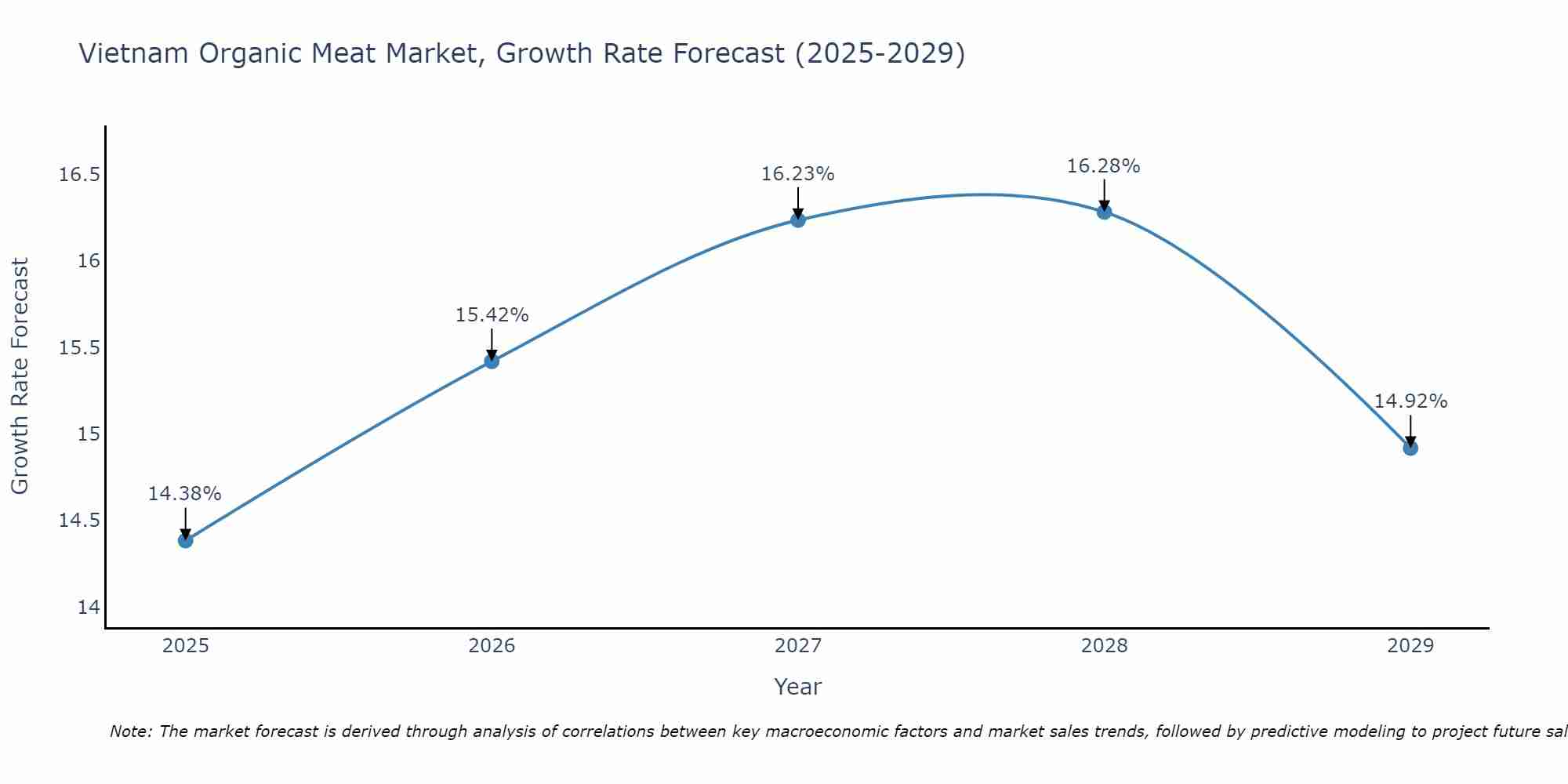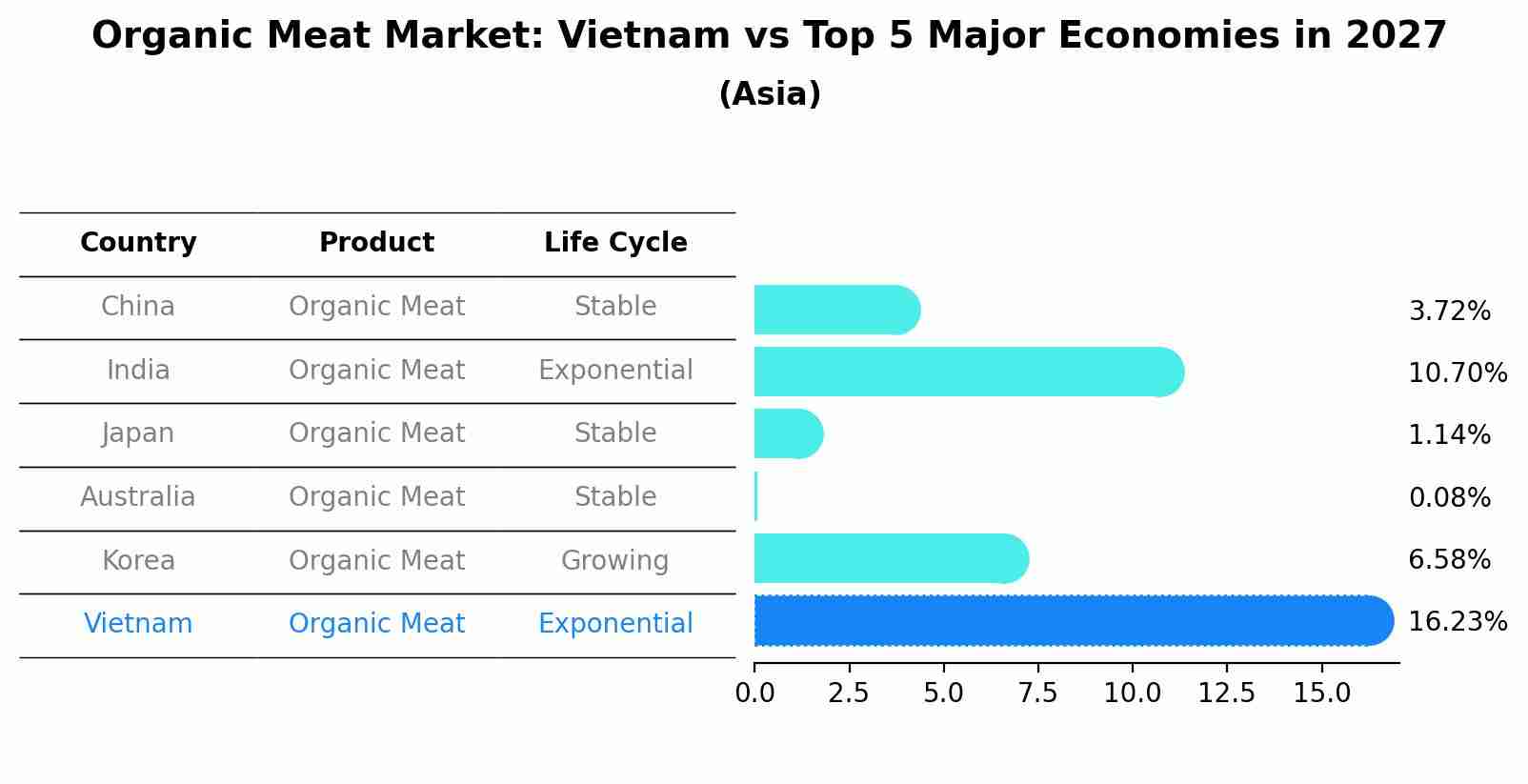Vietnam Organic Meat Market (2025-2031) Outlook | Revenue, Analysis, Size, Forecast, Growth, Value, Share, Industry, Trends & Companies
| Product Code: ETC383610 | Publication Date: Aug 2022 | Updated Date: Apr 2025 | Product Type: Market Research Report | |
| Publisher: 6Wresearch | Author: Ravi Bhandari | No. of Pages: 75 | No. of Figures: 35 | No. of Tables: 20 |
Vietnam Organic Meat Market Size Growth Rate
The Vietnam Organic Meat Market is projected to witness mixed growth rate patterns during 2025 to 2029. Growth accelerates to 16.28% in 2028, following an initial rate of 14.38%, before easing to 14.92% at the end of the period.

Organic Meat Market: Vietnam vs Top 5 Major Economies in 2027 (Asia)
The Organic Meat market in Vietnam is projected to grow at a exponential growth rate of 16.23% by 2027, highlighting the country's increasing focus on advanced technologies within the Asia region, where China holds the dominant position, followed closely by India, Japan, Australia and South Korea, shaping overall regional demand.

Vietnam Organic Meat Market Synopsis
The Vietnam organic meat market is evolving as consumers seek healthier and more sustainably produced meat products. Organic meat is sourced from animals raised without antibiotics, hormones, or synthetic additives. Local organic meat producers are working to meet this demand, offering a range of organic poultry, pork, and beef. The market is driven by health-conscious consumers and is expected to expand further with the growing interest in sustainable and ethical food choices.
Drivers of the Market
The Vietnam organic meat market is growing due to consumers` increasing preference for meat products free from antibiotics, hormones, and chemical additives. Health-conscious consumers are willing to pay a premium for organic meat, leading to the expansion of organic livestock farming. Government regulations and certification programs to ensure organic standards have further boosted market growth.
Challenges of the Market
The Vietnam organic meat market faces several challenges, with consumer perception being a significant issue. Some consumers may be skeptical of organic claims, doubting the authenticity of organic meat products. This skepticism can be fueled by a lack of standardized regulations and certification processes. Additionally, organic meat production often requires more significant land and resource investments, making it less accessible to small-scale farmers. The high production costs can result in elevated prices for organic meat, limiting its affordability for many consumers. Furthermore, competition from conventional meat producers, who can offer lower prices, poses a significant challenge to the growth of the organic meat market.
COVID-19 Impact on the Market
The COVID-19 pandemic presented challenges and opportunities for the Vietnam organic meat market. Supply chain disruptions and labor shortages affected production and distribution, leading to temporary shortages of organic meat products. However, as consumers sought healthier and safer food options, the demand for organic meat increased. Producers and retailers adapted to the changing market dynamics by expanding online sales channels and emphasizing the health benefits of organic meat. Despite the initial challenges, the market is poised for growth in the post-pandemic era.
Key Players in the Market
CP Foods and Masan Group are prominent players in the organic meat market, offering organic meat products to consumers.
Key Highlights of the Report:
- Vietnam Organic Meat Market Outlook
- Market Size of Vietnam Organic Meat Market, 2024
- Forecast of Vietnam Organic Meat Market, 2031
- Historical Data and Forecast of Vietnam Organic Meat Revenues & Volume for the Period 2021-2031
- Vietnam Organic Meat Market Trend Evolution
- Vietnam Organic Meat Market Drivers and Challenges
- Vietnam Organic Meat Price Trends
- Vietnam Organic Meat Porter's Five Forces
- Vietnam Organic Meat Industry Life Cycle
- Historical Data and Forecast of Vietnam Organic Meat Market Revenues & Volume By Type for the Period 2021-2031
- Historical Data and Forecast of Vietnam Organic Meat Market Revenues & Volume By Poultry for the Period 2021-2031
- Historical Data and Forecast of Vietnam Organic Meat Market Revenues & Volume By Beef for the Period 2021-2031
- Historical Data and Forecast of Vietnam Organic Meat Market Revenues & Volume By Pork for the Period 2021-2031
- Historical Data and Forecast of Vietnam Organic Meat Market Revenues & Volume By Others for the Period 2021-2031
- Historical Data and Forecast of Vietnam Organic Meat Market Revenues & Volume By Application for the Period 2021-2031
- Historical Data and Forecast of Vietnam Organic Meat Market Revenues & Volume By Food Services for the Period 2021-2031
- Historical Data and Forecast of Vietnam Organic Meat Market Revenues & Volume By Retail for the Period 2021-2031
- Historical Data and Forecast of Vietnam Organic Meat Market Revenues & Volume By Distribution Channel for the Period 2021-2031
- Historical Data and Forecast of Vietnam Organic Meat Market Revenues & Volume By B2C for the Period 2021-2031
- Historical Data and Forecast of Vietnam Organic Meat Market Revenues & Volume By B2B for the Period 2021-2031
- Vietnam Organic Meat Import Export Trade Statistics
- Market Opportunity Assessment By Type
- Market Opportunity Assessment By Application
- Market Opportunity Assessment By Distribution Channel
- Vietnam Organic Meat Top Companies Market Share
- Vietnam Organic Meat Competitive Benchmarking By Technical and Operational Parameters
- Vietnam Organic Meat Company Profiles
- Vietnam Organic Meat Key Strategic Recommendations
Frequently Asked Questions About the Market Study (FAQs):
- Single User License$ 1,995
- Department License$ 2,400
- Site License$ 3,120
- Global License$ 3,795
Search
Thought Leadership and Analyst Meet
Our Clients
Related Reports
- Afghanistan Apparel Market (2026-2032) | Growth, Outlook, Industry, Segmentation, Forecast, Size, Companies, Trends, Value, Share, Analysis & Revenue
- Canada Oil and Gas Market (2026-2032) | Share, Segmentation, Value, Industry, Trends, Forecast, Analysis, Size & Revenue, Growth, Competitive Landscape, Outlook, Companies
- Germany Breakfast Food Market (2026-2032) | Industry, Share, Growth, Size, Companies, Value, Analysis, Revenue, Trends, Forecast & Outlook
- Australia Briquette Market (2025-2031) | Growth, Size, Revenue, Forecast, Analysis, Trends, Value, Share, Industry & Companies
- Vietnam System Integrator Market (2025-2031) | Size, Companies, Analysis, Industry, Value, Forecast, Growth, Trends, Revenue & Share
- ASEAN and Thailand Brain Health Supplements Market (2025-2031) | Strategy, Consumer Insights, Analysis, Investment Trends, Opportunities, Growth, Size, Share, Industry, Revenue, Segments, Value, Segmentation, Supply, Forecast, Restraints, Outlook, Competition, Drivers, Trends, Demand, Pricing Analysis, Competitive, Strategic Insights, Companies, Challenges
- ASEAN Bearings Market (2025-2031) | Strategy, Consumer Insights, Analysis, Investment Trends, Opportunities, Growth, Size, Share, Industry, Revenue, Segments, Value, Segmentation, Supply, Forecast, Restraints, Outlook, Competition, Drivers, Trends, Demand, Pricing Analysis, Competitive, Strategic Insights, Companies, Challenges
- Europe Flooring Market (2025-2031) | Outlook, Share, Industry, Trends, Forecast, Companies, Revenue, Size, Analysis, Growth & Value
- Saudi Arabia Manlift Market (2025-2031) | Outlook, Size, Growth, Trends, Companies, Industry, Revenue, Value, Share, Forecast & Analysis
- Uganda Excavator, Crane, and Wheel Loaders Market (2025-2031) | Strategy, Consumer Insights, Analysis, Investment Trends, Opportunities, Growth, Size, Share, Industry, Revenue, Segments, Value, Segmentation, Supply, Forecast, Restraints, Outlook, Competition, Drivers, Trends, Demand, Pricing Analysis, Competitive, Strategic Insights, Companies, Challenges
Industry Events and Analyst Meet
Whitepaper
- Middle East & Africa Commercial Security Market Click here to view more.
- Middle East & Africa Fire Safety Systems & Equipment Market Click here to view more.
- GCC Drone Market Click here to view more.
- Middle East Lighting Fixture Market Click here to view more.
- GCC Physical & Perimeter Security Market Click here to view more.
6WResearch In News
- Doha a strategic location for EV manufacturing hub: IPA Qatar
- Demand for luxury TVs surging in the GCC, says Samsung
- Empowering Growth: The Thriving Journey of Bangladesh’s Cable Industry
- Demand for luxury TVs surging in the GCC, says Samsung
- Video call with a traditional healer? Once unthinkable, it’s now common in South Africa
- Intelligent Buildings To Smooth GCC’s Path To Net Zero


















